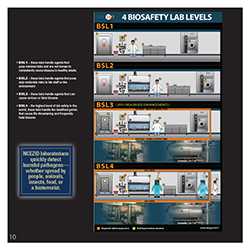NCEZID: Laboratory Expertise
NCEZID laboratories serve as vital reference laboratories for the United States and the world, aiding in critical disease detection, investigation, training, and public health research. In addition to managing the Laboratory Response Network, NCEZID provides oversight for a number of highly specialized laboratories.
NCEZID laboratories include:
- The Infectious Disease Pathology Lab is the primary unit at CDC that tests and evaluates tissues from patients with infectious diseases of unknown origin; they can test for more than 200 viruses and bacteria.
- Viral special pathogens labs work with some of the world’s most dangerous viruses that need to be handled at the highest biosafety level (BSL4) containment laboratory. Laboratorians sometimes deploy to the field, as they did during the Ebola epidemic to set up a laboratory in Bo, Sierra Leone.
- Bacterial special pathogens labs work on anthrax and other potentially deadly bacteria.
- Rickettsial zoonoses labs provide expertise in the diagnosis of diseases such as Rocky Mountain spotted fever and discovery of other tickborne disease pathogens. Tests developed by the labs have improved the speed and sensitivity of rickettsial pathogen detection.
- PulseNet labs and enteric (gastrointestinal) diseases labs are critical in rapidly identifying foodborne pathogens and helping control foodborne disease outbreaks.
- Healthcare-associated infections (HAIs) laboratories look at causes of infectious illnesses occurring in patients who receive health care. They also issue protocols that partners can use for testing for specific pathogens causing HAIs.
- The Biotechnology Core Facility is a collection of six laboratories that use cutting-edge technologies like genomic sequencing to test for infectious and biothreat agents. It also evaluates emerging technologies for improving diagnostic tests as part of the Advanced Molecular Detection Program.
Some important work NCEZID laboratories have produced includes:
- Discovering and characterizing new infectious disease threats.
- Providing an early warning system for new or emerging viruses like chikungunya.
- Monitoring changes in known germs that hurt people, including new drug-resistant strains like carbapenem-resistant Enterobacteriaceae (CRE) in hospital settings.
- Preparing reference materials (strains, cultures, and blood samples) that help confirm germs and providing quality assurance for other laboratories.
NCEZID laboratorians quickly detect harmful pathogens— whether spread by people, animals, insects, food, or a bioterrorist.
- Page last reviewed: August 28, 2017
- Page last updated: August 28, 2017
- Content source:
Centers for Disease Control and Prevention
National Center for Emerging and Zoonotic Infectious Diseases (NCEZID)


 ShareCompartir
ShareCompartir
